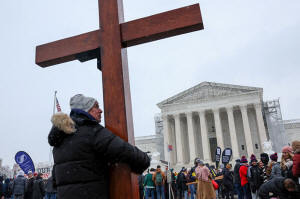How US public schools became a new religious battleground
 Send a link to a friend
Send a link to a friend
 [August 07, 2024]
By Liya Cui and Joseph Ax [August 07, 2024]
By Liya Cui and Joseph Ax
(Reuters) - It is a foundational democratic tenet taught in every basic
U.S. history course: the Constitution bars the government from endorsing
an official religion or favoring one over others.
But moves by two Republican-governed states - Louisiana's requirement
that public schools display the biblical Ten Commandments and Oklahoma's
mandate that public schools teach the Bible - take aim at the
Constitution's "establishment clause," long understood by courts as
separating church and state.
Lawmakers in 29 states have proposed at least 91 bills promoting
religion in public schools this year, according to Americans United for
Separation of Church and State, an advocacy group backing a lawsuit
challenging Louisiana's law. Rachel Laser, its chief executive, said the
group tracked 49 similar bills in 2023.
The movement is fueled by opposition to what conservatives call liberal
curriculums, including a focus on diversity and LGBT rights, and by the
U.S. Supreme Court's willingness to overturn precedent as it moves
American law rightward.
Republican Louisiana Attorney General Liz Murrill, whose office is
defending the Ten Commandments law in court, said on Monday that
legislators frustrated by a lack of discipline in schools turned to the
biblical precepts to "start a conversation about order."
"That's the fundamental message that exists in our legal structures
about what Moses stood for and what the Ten Commandments stood for,"
Murrill told a press conference.
When asked how non-religious parents could respond to the law,
Republican Louisiana Governor Jeff Landry told the press conference they
could tell their children not to look at Ten Commandments posters.

Conservatives are hopeful that legal challenges will give the Supreme
Court an opportunity to reconsider longstanding limits on religious
expression in public schools.
"They see the writing on the wall of what the Supreme Court is doing,"
said law professor Steven Green of Willamette University in Oregon, who
wrote the book "Separating Church and State: A History."
A week after Louisiana in June became the first state to require schools
to display the Ten Commandments since the Supreme Court struck down a
similar Kentucky law in 1980, Oklahoma's schools superintendent, Ryan
Walters, directed all public schools to teach from the Bible.
Under Oklahoma's guidelines, teachers will be given a copy of the Bible
and focus on its historical context in Western society and American
history, its literary significance, and its influence on the arts and
music. Several Oklahoma school districts have refused to alter their
curriculums to accommodate the policy change.
Walters did not respond to a request for comment.
In both states, officials said the religious texts are important to
understanding the birth of American government. The claim echoes
arguments by some Christian conservatives that the United States was
founded as a Christian country, an idea many historians call inaccurate.
CHRISTIAN LAWMAKERS
The National Association of Christian Lawmakers (NACL), founded in 2020,
has coordinated legislative efforts across different states. It has
produced three dozen "model" bills for introduction in state
legislatures, including one on the Ten Commandments and another
requiring schools to display "In God We Trust" signs.

[to top of second column]
|

Dan Beazley carries a cross as he participates in the annual "March
for Life" for the second time since the U.S. Supreme Court
overturned the Roe v. Wade abortion decision, in Washington, U.S.,
January 19, 2024. REUTERS/Amanda Andrade-Rhoades/File Photo

Republican Louisiana Representative Dodie Horton, the sponsor of
that state's Ten Commandments bill and a member of the association,
did not respond to a request for comment.
The next major battleground could be Republican-governed Texas,
which passed the first law in the United States last year letting
public schools hire chaplains as counselors. Similar bills
subsequently were introduced in more than a dozen states.
The Texas board of education will decide in November whether to
approve a new elementary school curriculum that includes Bible
teachings. Texas Republican lawmakers are likely to revive bills
requiring the display of the Ten Commandments in schools and
allowing publicly funded vouchers to pay for student tuition at
private religious schools.
In an interview last month at the Republican National Convention,
the NACL's founder, former Arkansas state Senator Jason Rapert,
argued that religious values are disappearing from American public
life, imperiling the future.
"The Judeo-Christian history and heritage of the nation has been
torn down in many places," Rapert said.
Opinion polls show that while a solid majority of Americans identify
as Christians, the number has been declining for decades.
A CONSERVATIVE SUPREME COURT
The Supreme Court in 1962 ruled that school-sponsored prayer in
public schools violated the establishment clause. But the court,
which now has a 6-3 conservative majority, has taken an expansive
view of religious rights in some important cases in recent years.
In 2022, it ruled that a Washington state public school district
violated the constitutional rights of a Christian high school
football coach who was suspended for refusing to stop leading
prayers with players on the field after games. In doing so, it
abandoned a 1971 precedent that had outlined how to determine if a
law violated the establishment clause.
The ruling galvanized conservative Christians, as did the court's
decision days earlier rolling back abortion rights.
The court also has made it easier for religious schools and churches
to receive public money; exempted family-owned corporations from
having to provide employee insurance coverage for women's birth
control on religious grounds; and backed a Christian baker and a
Christian web designer who refused to provide services for same-sex
weddings.

Rapert called the court's evolving view on religion in public life a
"great opportunity."
If new laws on religion and public schools are challenged at the
Supreme Court, it will have to answer questions such as whether they
make a denominational preference or coerce people to participate in
a religion, said law and religion professor Michael Helfand of
Pepperdine University in California.
"Should I feel religiously coerced if the state puts up the Ten
Commandments in my classroom?" Helfand asked. "I could see a court
going either way on that."
(Reporting by Joseph Ax and Liya Cui in New York; editing by Will
Dunham and Donna Bryson)
[© 2024 Thomson Reuters. All rights
reserved.]This material
may not be published, broadcast, rewritten or redistributed.
Thompson Reuters is solely responsible for this content. |